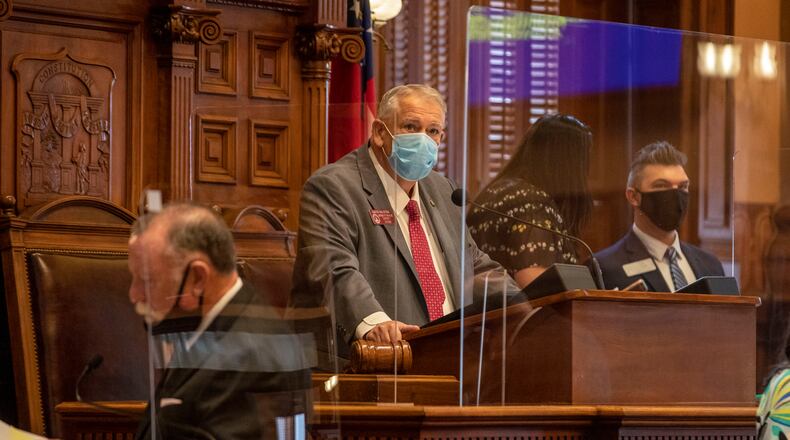The Georgia General Assembly re-opened for business Monday with calls to finally pass hate crimes legislation.
The rebooting of the 2020 session, which was suspended in March because of the coronavirus pandemic, came as protesters calling for racial and social justice rallied inside and outside the Capitol.
Hate crimes legislation has stalled in the Senate after passing the House last year.
House Speaker David Ralston, R-Blue Ridge, told colleagues on Monday:
“All Georgians were shocked by the senseless murder of Ahmaud Arbery, who was hunted like an animal and shot with a shotgun at point blank range.
"Then we later learned that the shooter stood over his body as his life ebbed away and pronounced his benediction with the most vile of racial slurs. Members of this body, that is hate.
"If we leave here this session without passing a hate crimes bill, it will be a stain on this state that we can never wash away."
>>PHOTOS: Georgia lawmakers return to Capitol after coronavirus
>>RELATED: Thousands of demonstrators at Georgia Capitol as Legislature reconvenes
>>PHOTOS: Thousands march at Georgia Capitol as lawmakers return
The measure would allow stiffer sentences for anyone convicted of targeting a victim based on race, color, religion, national origin, sexual orientation, gender, mental disability or physical disability.
Recent police killings of black men and the shooting of Arbery, an unarmed black jogger near Brunswick, have increased the call for reform.
“Let’s try, let’s do it, let’s catch up,” Sen. Gloria Butler, D-Stone Mountain, urged colleagues. “It’s not everything we want. Let’s start the process now and move Georgia forward. The people of Georgia deserve that.”
Sen. Lester Jackson, D-Savannah, said “hate crimes” have been happening for decades, but the ability of cell phones to record them is providing evidence to people who might not have wanted to believe it.
“The blinders are off,” he said. “We know hate crimes exist. It is not just a black issue, it is not a Democratic issue, it’s a peoples issue. It is the right thing to do.”
Sen. Zahra Karinshak, D-Duluth, said, “Let us stand against hate together.”
Sen. Randy Robertson, R-Cataula, a retired law enforcement officer, defended the police, calling them “my people.
“The men and women of law enforcement, they do not hate,” he said, asking colleagues not to cut funding to state law enforcement officers when they approve a new budget in coming days.
Sen. Jeff Mullis, R-Chickamauga, told fellow senators, “Georgia is open for business. We respect the men and women in blue.”
Referring to the “defund the police” call from some protesters, Mullis said Georgia should be attractive to businesses from other states because it will not cut police funding.
In the House, Ralston urged the Senate to move on the hate crimes bill.
"Lip service and talk will not pass this or any other bill. We must proclaim from every corner of this state that Georgia is better than this.”
Some powerful Senate leaders have raised objections, including Jesse Stone, the Republican chairman of the Senate Judiciary Committee.
Lt. Gov. Geoff Duncan, the Senate’s president, wants changes to the House measure that he says would strengthen it. That means even if a version is approved by the Senate, it would have to return to the House for another vote, and it barely got enough support to pass the last time.
Georgia is one of few states in the nation without such a measure after a previous law was declared unconstitutional in 2004.
The Georgia General Assembly returned Monday after a three-month coronavirus pandemic suspension facing more than $2 billion in spending cuts, along with the hate crimes debate.
Lawmakers suspended the 2020 session in mid-March with 11 working days remaining as the virus spread across the state.
Most of the serious business each session gets done in the final days, so the suspension left a lot of work undone.
The pandemic has caused a massive recession, with record unemployment and thousands of business either closed or struggling to remain open. That, in turn, has sent state tax collections - mostly income and sales taxes - plummeting.
Lawmakers must, by law, pass a budget before the new fiscal year starts July 1 - and they face cutting about $2.6 billion for everything from K-12 schools and universities to the state patrol, food safety inspections, highway construction, mental health and substance abuse programs and county health department funding.
About the Author
Keep Reading
The Latest
Featured




